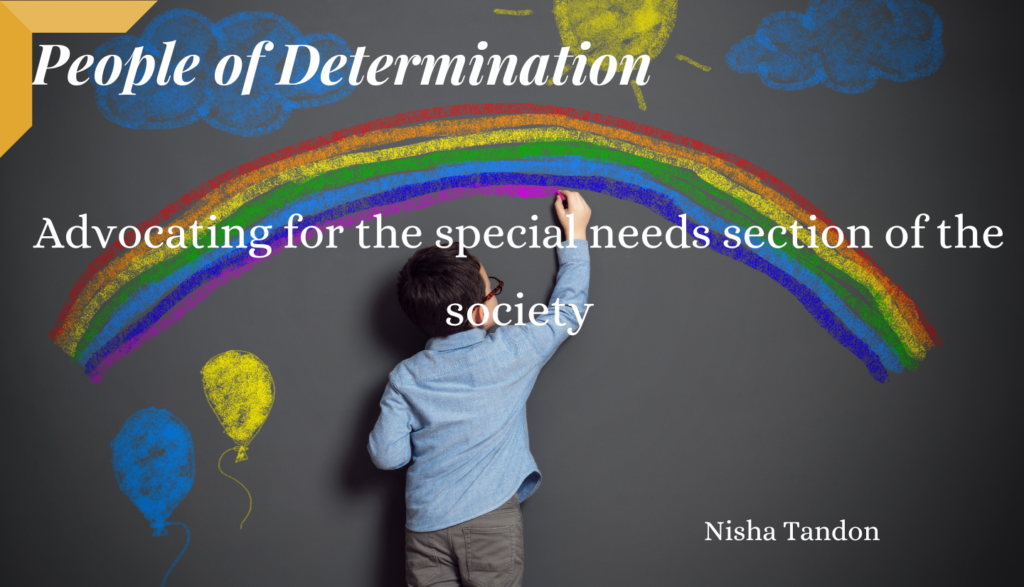
Dear Readers
Every month we present insights, views and ways of parenting and nurturing special needs children. This month our writer, Nisha Tandon, has articulated her interview with Ms. Fionika Sanghvi, principal of SPJ Sadhana School for Special Needs, Mumbai, to share the perspective of a facilitator about the manner that can augment the development of special needs children.
The role of the facilitator is not only to follow the standard methods but also to encourage and understand these children by finding new approaches that contribute to their overall development and we as a community, appreciate and acknowledge their efforts.
I hope you find this information beneficial.
Editor, ALSphere Magazine
Advocating for the special needs section of the society
Parents of children with disabilities are always concerned about child rearing and their education. Professionals who specialize in this field serve an important role as advocates for these students. Understanding the concerns and perspectives of these parents is essential to working effectively as partners in their children’s education. Ms. Fionika Sanghvi, the Principal of SPJ Sadhana School for Special Needs, Mumbai, gives us an insight into what goes behind the efforts to design the personalized curriculum for these children.
On being asked if the school employs different teaching techniques for children with differing abilities, Ms. Fionika replied in the affirmative and said it is essential to do so as the learning style of each child can be different. Some can be visual learners, some auditory learners, and others tactile and kinaesthetic learners; hence one technique may not be effective for every child. Alongside, extra-curricular activities add to a child’s exposure and learning. It’s a holistic approach to the development of a special needs child. The Centre also engages the students in art sessions, which is very impactful as it is used as a therapeutic intervention besides perusing it as a vocational stream for a child with special needs.
Ms. Fionika further reinstated that though functional academics are beneficial for most children with special needs, exceptions are possible. If a child shows the ability, inclination and talent for academics, then it can be pursued in different ways, i.e. through inclusive education. She, as a facilitator, feels that academics and extracurricular activities, if treated with equal importance, can provide a balanced educational program to a child with special needs.
If a child is not academically inclined, then the teacher, principal and the school management can identify other talents, interests and abilities of the child and help pursue them. The focus and involvement will be far superior if the child enjoys what he is doing.
On being enquired about how the school makes decisions for the vocational fields of a child, and when they start developing and nurturing these skills, Ms. Fionika clarified that for vocational training, the decision depended on the child’s ability, sustainability of the skill as well as a conducive environment, and possibilities to pursue the vocational skill. This is noticed and studied over a period. A team of experts (special educators and therapists) assesses, reviews, and reports on the selection of a vocation for a child.
Vocational training can open many avenues for a child from where a life goal can be considered. But all this is possible only if there is an effective Parent-Teacher partnership that is the key to an all-around development of a child with special needs. Parents are equal partners for the learning to be internalized in a child.
An array of pre-requisite skills for vocational training or pre-vocational skills can be introduced to a child as early as in the formative years. Therapeutic intervention (OT, Speech, Sensory integration), soft skills, and counseling also contribute to the nurturing and development of vocational skills.
There are arenas which are being explored in the field of academics and activities for people with special needs; it’s an ongoing process. The special needs centers provide their students, access to educational services that allow them to enjoy the same rights as students without disabilities, setting forth a framework that emphasizes that instruction should be provided in a regular classroom- a classroom specially modified to meet the special needs of students, or under special conditions (individualized education or instruction in small groups in a special-needs classroom).
“The duties of a teacher are neither few nor small, but they elevate the mind and give energy to the character” – Dorothea Dix
Nisha Tandon

0 Comments